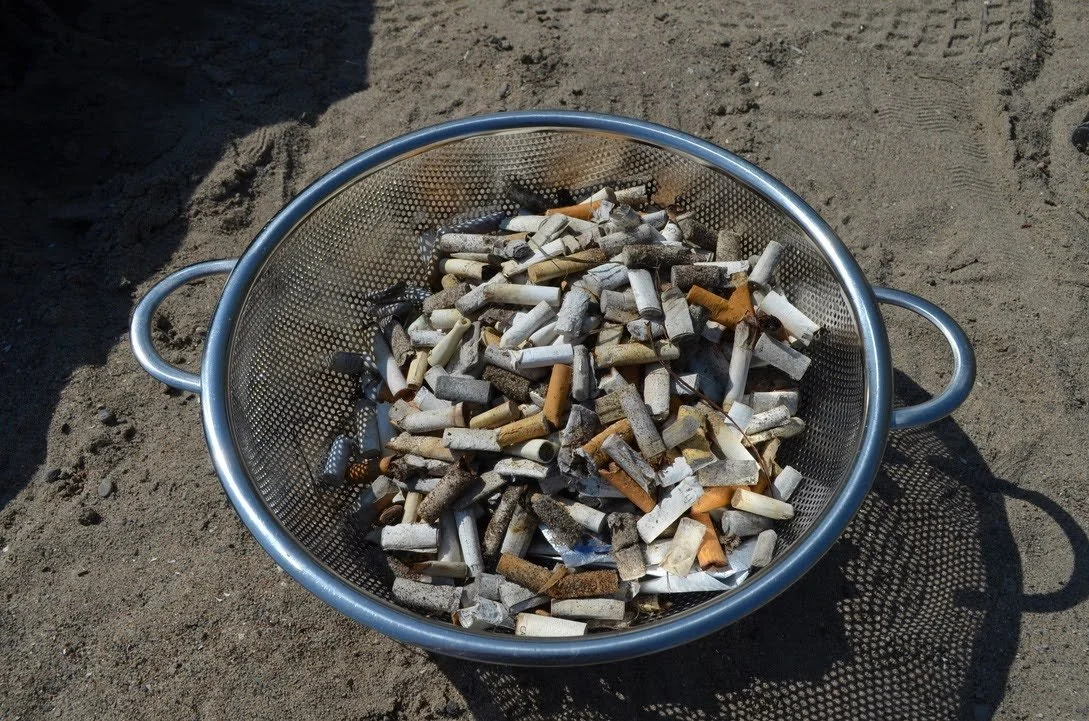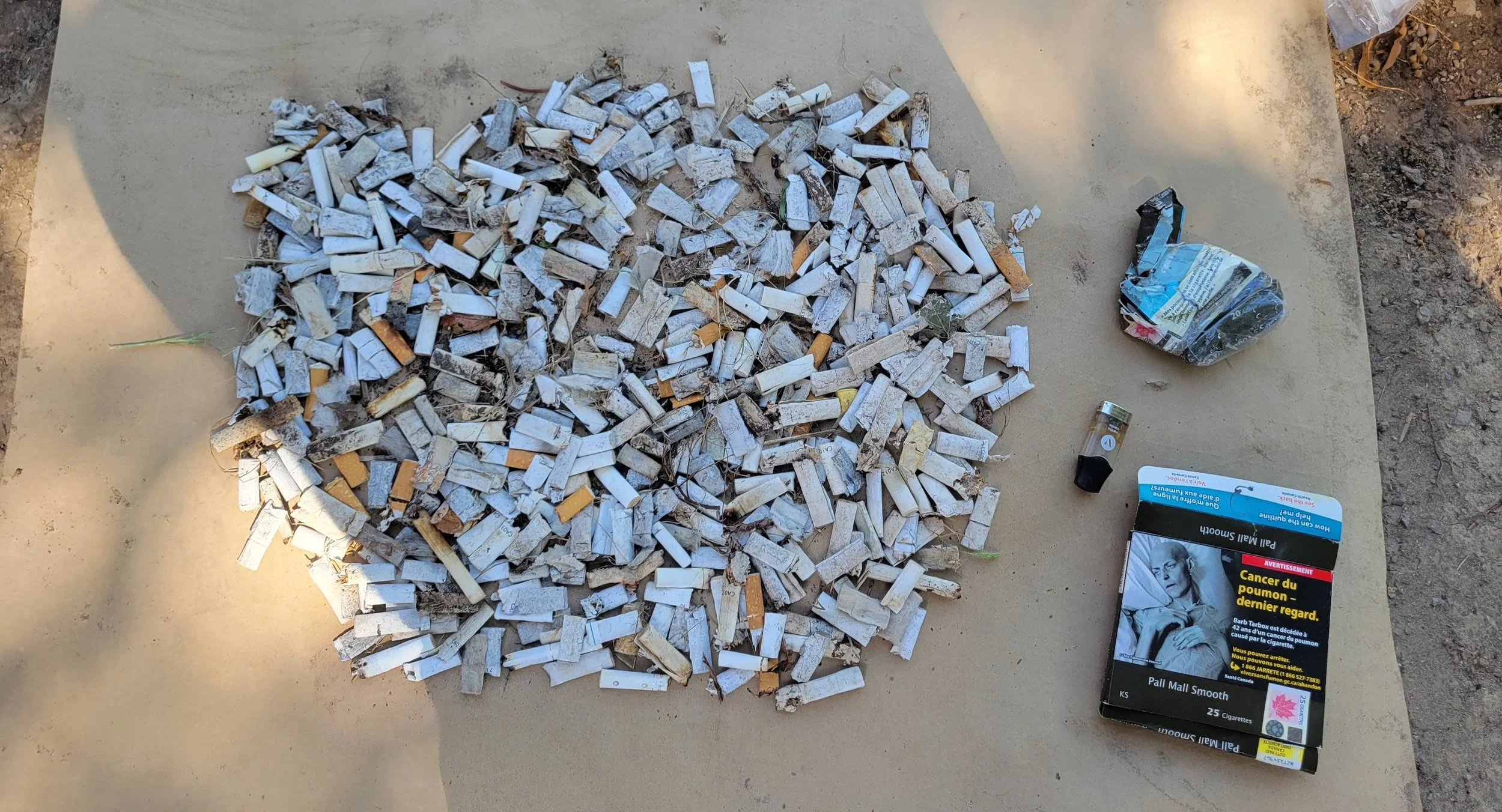A Burning Issue: Cigarette Butts and Fire Risk in 2025
When we think about the dangers of cigarette butts, we often focus on pollution, not fire. But in 2025, with climate change intensifying drought conditions across Canada, the risk of wildfires caused by improperly discarded cigarette butts is higher than ever. As wildfires become more frequent, fast-moving, and destructive, it's crucial to understand how something as small as a smouldering cigarette can spark disaster.
According to Natural Resources Canada, humans cause over half of all wildfires, with cigarette butts being a leading culprit. In fact, cigarette-related ignition sources are responsible for up to 5% of house fires in the United States, and similar patterns are seen in Canada. A carelessly tossed cigarette can ignite grass, mulch, or even garbage, especially in hot and dry conditions.
The Hidden Fire Hazard of a Single Cigarette
One of the greatest dangers of cigarette butt fires is how easily they go unnoticed. A cigarette left burning in dry grass, bark mulch, or even a planter can smoulder undetected for hours, especially during hot Canadian summers.
In 2024, several brush fires in British Columbia and Alberta were linked to cigarette litter. For instance, a fire in Langford, BC, damaged multiple properties after starting in a roadside ditch, highlighting how quickly these seemingly minor ignitions can escalate. In October 2024, a carelessly discarded cigarette caused a fire in Vancouver's Strathcona neighbourhood that wrecked three homes and left 11 people homeless. Even the Elephant Hill wildfire in BC in 2017, which burned over 191,000 hectares and destroyed more than 100 homes, causing over $1 billion in damages, was attributed to smoking materials.
The summer of 2025 has been particularly dry, creating conditions highly conducive to more fires. As climate patterns shift and fire bans become increasingly common, the danger posed by cigarette butt fires extends well beyond rural areas. In July 2025, a fire in Collingwood, Ontario, caused by cigarette butts tossed in a garbage can, resulted in $1 million in damages to a home and displaced several people. Similarly, a discarded cigarette is believed to have sparked a fire in Charlottetown’s Beach Grove area in August 2025, scorching roughly 1,000 square feet of woodland before firefighters contained it.
The Current Landscape: A Tinderbox Awaiting a Spark
This year, the threat feels particularly acute. Large swaths of Canada are already experiencing extreme drought, turning vast areas of forest, grassland, and even urban vegetation into a tinderbox. News headlines are dominated by reports of new fires igniting daily, forcing evacuations and blanketing communities in smoke. You can see the current wildfire situation across the country on CBC's interactive climate dashboard.
In this heightened state of alert, the smallest spark can have catastrophic consequences. A single, seemingly innocuous cigarette butt, still smouldering after being flicked from a car window or dropped on a patio, becomes a direct threat to homes, livelihoods, and precious natural habitats. It's not just about the immediate flame; it's about the potential for a small, unextinguished ember to escalate into a larger fire that overwhelms emergency services and devastates entire regions.
The responsibility to prevent these human-caused fires falls on all of us. As communities grapple with the immense challenges posed by a prolonged and intense wildfire season, every effort to mitigate risk becomes paramount. Discarding a cigarette butt improperly is no longer just an act of littering; it's a direct contribution to a national crisis, potentially adding to the burden on firefighters and displacing thousands.
Proper disposal of cigarette butts helps prevent accidental fires and environmental damage. Yet every year, billions of cigarette filters made of plastic, not paper, are littered globally.
The issue extends far beyond immediate fire risks. Cigarette filters, often mistakenly thought to be biodegradable, are primarily made of cellulose acetate, a type of plastic. This material can take anywhere from 18 months to 10 years to decompose, depending on environmental conditions. Even then, they don't truly biodegrade but rather break down into microplastics, further polluting our environment.
No Ifs, Ands, or Butts: Fire Safety Starts With Personal Responsibility
This isn’t just about preventing wildfires. It’s about protecting neighbourhoods, apartment buildings, forests, and parks. With increased pressure on emergency services across the country, the best fire is the one that never starts.
If you smoke, use proper receptacles or consider a portable ashtray—especially in high-risk areas like campsites, balconies, parking lots, or nature trails. If you manage a property, workplace, or business, consider installing outdoor ashtrays and signage encouraging safe disposal.
By promoting responsible habits, we reduce the risk of both fire and litter. It’s a small action that protects homes, wildlife, and entire communities.’
You Can Help Reduce the Risk
The fight against cigarette litter and the fire risk it poses is a collective effort. At A Greener Future, we've been on the front lines of this battle for years. To date, we have proudly collected and recycled over 5.1 million cigarette butts from communities across Canada since 2015.
This September, we're taking our efforts to an unprecedented scale with the UNSMOKE Butt Blitz, Canada's Largest Cigarette Litter Cleanup. Our ambitious main goal throughout September 2025 is to collect and recycle an astounding 1 million cigarette butts nationwide. The main events will take place on September 20, 2025, World Cleanup Day, with major cleanup events planned for Montreal, Vancouver, Toronto, and other cities across the country.
This isn't just about cleaning up; it's about safeguarding our environment from what seems like a small piece of trash, but that has a large impact. These plastic filters, laden with microplastics and toxins, not only pollute our water and harm wildlife but also pose a significant and growing fire risk, especially in our increasingly dry climate. By joining the UNSMOKE Butt Blitz, you're directly protecting our local waterways from contamination, safeguarding our drinking water, and reducing the risk of devastating fires.
Want to be part of the solution and make Canada cleaner and safer?
Join the UNSMOKE Butt Blitz! Your participation helps us kick the problem’s butt, one litter-free community at a time. See our list of upcoming events to find an event near you and register today.



